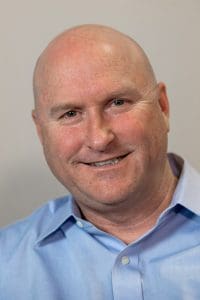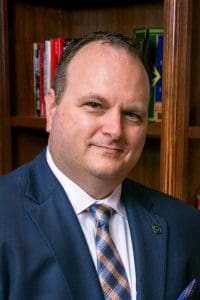 The word “counterfeiting” leads many people to think about money. But the problem is much larger than phony $20 bills sneaking into circulation. It involves the illegal production, distribution and use of products, technology, intellectual property and so much more.
The word “counterfeiting” leads many people to think about money. But the problem is much larger than phony $20 bills sneaking into circulation. It involves the illegal production, distribution and use of products, technology, intellectual property and so much more.
The Center for Anti-Counterfeiting and Product Protection aims to stop that. A-CAPP is an independent, interdisciplinary, evidence-based hub focusing on research, education and outreach designed to assist in protecting brands and products of all industries worldwide.
And it’s housed at Michigan State University. A-CAPP got its start through the school of criminal justice after a number of MSU alumni expressed an interest in a need for this type of protection in a broad range of industries.
“The center’s focus on counterfeit goods is fueled by a major business problem,” said Jeff Rojek, director of A-CAPP. “This is beyond enforcing trademarks. If a corporation acknowledges a counterfeiting problem, it acknowledges consumers may have purchased bad goods in the company’s name. Companies want to engage in being proactive about this.”
 While the center was initially working with several alumni corporate leaders, its reach has grown significantly beyond the MSU alumni network. “Corporate connections have been critical to the center’s success,” said Jeremy Wilson, the founder of A-CAPP. Over the years, the center has developed because of its close connection to industry, research partners and outreach and training. But the real gamechanger, Wilson said, was the industry advisory board.
While the center was initially working with several alumni corporate leaders, its reach has grown significantly beyond the MSU alumni network. “Corporate connections have been critical to the center’s success,” said Jeremy Wilson, the founder of A-CAPP. Over the years, the center has developed because of its close connection to industry, research partners and outreach and training. But the real gamechanger, Wilson said, was the industry advisory board.
“Those close partnerships have helped shape the ideas and work the center is doing,” he said. “The value of the alumni and the broader network to the center can’t be overstated – they’ve been critical. They are critical. They provide ideas, resources and entrees into organizations that would be very difficult to get otherwise.”
Wilson said the partners support A-CAPP because they believe in the work being done to strengthen this increasingly important component of business. A-CAPP serves dual purposes – as an education program for students interested in going into this field and as a certificate-based program for corporate brand protection.
“There’s currently no degree for this,” Rojek said. “Our students are able to intern with our corporate partners, and that translates into jobs for them.” The center’s work is fueled by its outreach and corporate partnerships. A-CAPP hosts an annual summit on brand protection strategy, creating a network of experts from corporations, law enforcement and the academic community to work together to combat counterfeiting.
“We try to expand our focus beyond the big brands,” Rojek said. With so much ecommerce – selling through websites and social media – smaller entities can really be hurt financially if their goods or work are stolen.
“No one had been leading this fight against counterfeiting, against intellectual property violations,” Wilson said. “With MSU’s land grant role and top-ranked programs in criminal justice, supply chain, engineering, and other related disciplines we’re uniquely qualified to provide intellectual leadership in this area.”
With the help of those corporate partnerships, A-CAPP is better equipped to tackle the problems and issues surrounding counterfeiting and, in turn, can train businesses to watch out for their own best interests.
“The center gets to play a unique role, connecting academic knowledge and resources to these very real business and legal challenges,” Rojek said. “It’s fascinating work. And it’s a great opportunity.”
